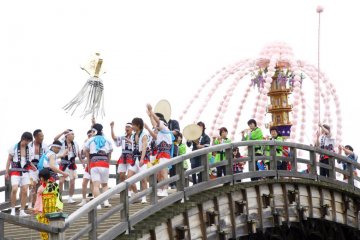
Kintaikyo Festival 2026
Paul WalshEdo-era costume parade in this annual reenactment of the return of the local lord over one of the world's most beautiful bridges.

The Kintai Bridge, built in 1673, is a historic wooden arch bridge in Iwakuni, Yamaguchi. Located at the foot of Mount Yokoyama, home to Iwakuni Castle, the bridge is known for its five graceful wooden arches.
The three middle arches of the bridge have a span of 35.1 meters, while the two end arches have a span of 34.8 meters. Four stone pillars and two wooden pillars support the arches.
The bridge and castle are near Kikkou Park and are a popular tourist destination, especially in spring and autumn when visitors can see the cherry blossoms or the colorful autumn leaves. In 1922 the bridge was declared a national treasure.
Five wooden bridges are connected over four piers. The bridge itself is about 200 meters wide. The three central bridges are arch bridges while the bridges attached to the shoreline are girder bridges. This type of structure is rare in the world of bridges and there are no UNESCO World Heritage Site bridges with a similar structure. During a 2005 typhoon, the bridge even stood up against damage to its girder piers thanks to its connection structure.
The wood used for the current bridge’s body is red pine, cypress, zelkova, chestnut, oak, and hinoki wood. During the Heisei period when the wood was replaced, timber was collected from the entire country making this bridge 100% domestic lumber. The bridge piers once collapsed during the Showa reconstruction but were recollected and the cobblestone built once more using the original stone, with concrete supports.
The Kintai Bridge has almost completely preserved its restoration records from the time of its creation to the present day. According to records, during the Edo period the three center bridges were replaced every 20 years and the shoreline bridges were replaced every 40 years. The balustrade has been replaced every 15 years. It’s said that this method of restoration lent itself to the success of growing carpentry skills and technology.
A 20 minute walk from Kawanishi Station and Nishi-Iwakuni Station – from the latter, buses (11, 14, 21, 30, 34) can take you to the Kintaikyo Bus Center in about 13 minutes, just beside the bridge entrance.

Edo-era costume parade in this annual reenactment of the return of the local lord over one of the world's most beautiful bridges.

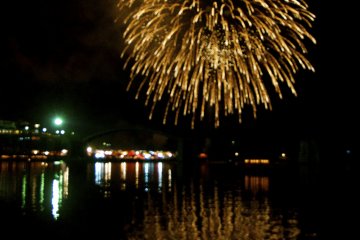
Beautiful, colorful and fun - a great way to enjoy one of Japan's most famous & historical bridges enjoying one of Japan's most popular summer activities.

Iwakuni's Famous Kintaikyo Bridge is a fantastic backdrop for an annual fireworks festival Matsuri.

Edo-era costume parade in this annual reenactment of the return of the local lord over one of the world's most beautiful bridges.
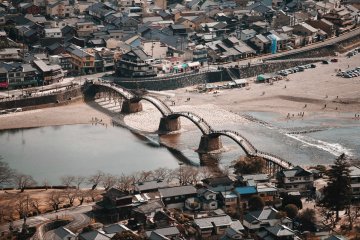
The Kintai Bridge of Iwakuni is one of the most famous bridges in Japan. It stretches across the Nishiki River in five magnificent arches.
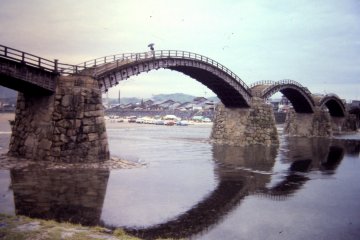
If someone asked me, what is the most beautiful bridge (in the world)? I will reply ' Kintai ', because as far as I have seen, there are no bridges like this bridge, where elegance, subtlety, refinement, perseverance and human determination meet beautifully with nature. I am not over praising, Kintai Bridge is really like that.
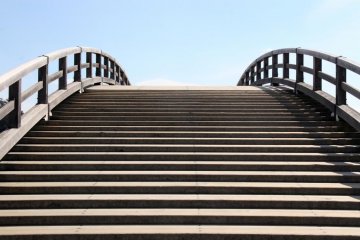
Iwakuni city (岩国市) is located in Yamaguchi-ken. It was formerly a castle town that belonged to the warrior Lord Hiroie Kikkawa during the Edo period.

Learn about Kintai Bridge, a beautiful sight-seeing spot located near Hiroshima.
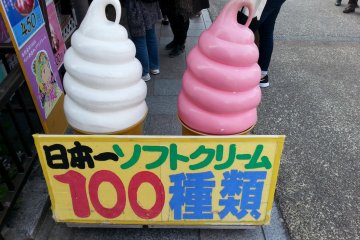
After crossing Kintai Bridge, in the front of Kikko Park, there are at least three ice cream shops. One had about twenty flavors, another had about fifty. However, there is another one that attracted me to Iwakuni, with 100 flavors of ice cream. Yes, a hundred flavors! There are the usual chocolate, strawberry, vanilla flavors, along with novelty ones like soy sauce, ramen and natto, to name a few.
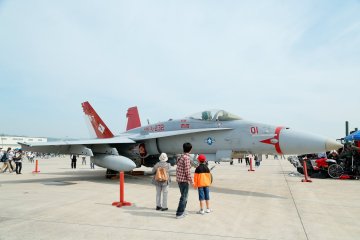
The Iwakuni Friendship Day event sees Marine Corps Air Station Iwakuni open its gates to the general public, in celebration of US-Japan relations. There will be food, activities for children, and aircraft

Simose Art Museum is a beautiful contemporary art museum located near Hiroshima in the town of Otake. The location on the Setouchi Inland Sea makes it a destination worth seeking o

Hiroshima's Simose Art Museum gained international acclaim recently by winning the Prix Versailles, a UNESCO-established award recognizing architectural excellence across a number of categories.